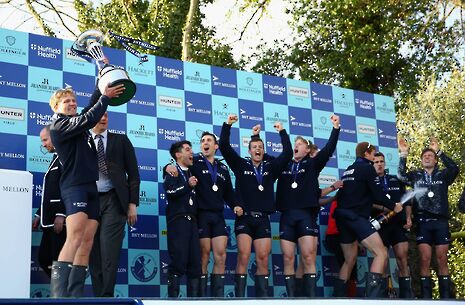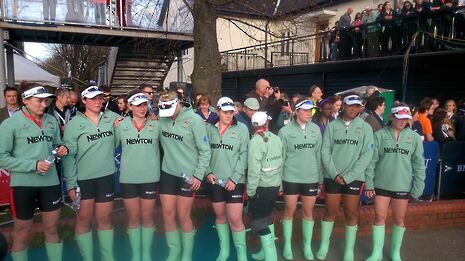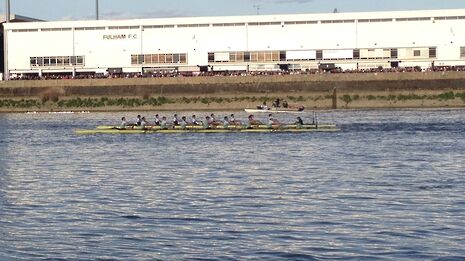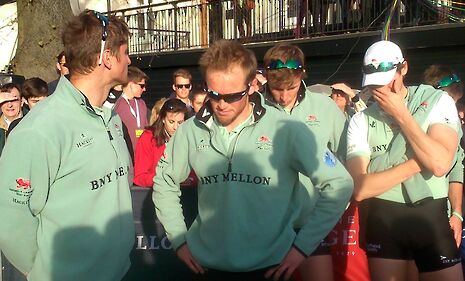Cambridge crushed as Dark Blues dominate in Boat Races
With Oxford’s clean sweep of victories on an historic day on the Tideway, Peter Rutzler questions the future of Cambridge sport

History was made on the Tideway on Saturday afternoon as the Oxford and Cambridge Women contested the four and a quarter mile course for the first time, on the same day as their male counterparts, bringing an end to years of inequality in a move that was long overdue.
Yet, despite the historic occasion, the races themselves will certainly not be ones that the Cambridge crews will remember fondly as they were outclassed by dominant Oxford eights, raising questions over whether Cambridge can continue to compete under the university’s current approach to sport.
But the main story of the afternoon lay with the fact that for first time in 88 years, the women rowers of Oxford and Cambridge were given an equal platform to perform alongside their male counterparts on a glorious afternoon in South-West London.
The Oxford women, led by their Club President Anastasia Chitty, were strong favourites coming into the race, at 1/6 with some bookmakers. This prediction came to fruition with a strong display of dominance from Oxford, winning the race by a full 19 seconds and six and a half lengths.
Likewise, the Oxford men, also strong favourites for Tideway triumph, powered to victory by the same winning margin as their female counterparts, recording a time of 17 minutes and 45 seconds and their 11th win in their last 15 meets on the Thames. To round off a day of defeats for the Light Blues, Isis overcame Goldie in the reserve race, winning by three lengths.

The afternoon began with the historic Women’s race, one that finally puts women at the heart of this distinctly British sporting spectacle. The respective Cambridge and Oxford Club Presidents, Caroline Reid and Anastasia Chitty, made their first appearance for a significant coin toss, marked aptly by the introduction of a solid gold medallion. Reflecting what was to come, Chitty and Oxford won the toss.
Then it was on to the race itself – one which marked the end of a long journey for women’s sport and the rowers of both universities.
Oxford pulled ahead and were a length clear after the first minute – a lead they never looked like relinquishing as they proceeded to cruise to the finish in a strong headwind, leaving the Cambridge Light Blues trailing quite literally in their wake.

Boasting the likes of the imperious Caryn Davies at stroke, the most decorated Olympian to ever take part in either of the Boat Races having won Olympic gold medals in Beijing and in London, Oxford were able to secure a sixth win in eight, and they continue to chip away at Cambridge’s overall lead, which now stands at 40 wins to Oxford’s 30.

Anastasia Chitty told the BBC: "To row on the same stage as the men, there were so many women before us who have never had this opportunity and it’s really humbling. We started moving away early on and kept ourselves ahead."

In the men's race, Alex Leichter won the toss for Cambridge, taking (as every coin toss winner does) the Surrey station for the race. However, the race was perhaps lost in the first ten strokes, as Cambridge lurched poorly out of the starting-blocks. Despite keeping in touch through the all-important first bend, by the two mile post, Oxford had pulled clear.

While for Luke Juckett there was thankfully to be no repeat of last year’s clash that all but ended the race, spectators would have been forgiven for thinking a similar incident had occurred as Oxford ran away with it, achieving three wins in a row for the Dark Blues, and a fourth in four for Oxford’s Club President Louloudis, who missed the 2012 defeat for the London Olympics.
Post-race, Louloudis described the victory: “It feels fantastic, the first feeling was an overawing sense of relief, when you’re going in as favourites and in my own personal position having not lost, I had this nightmare of having won three and losing one as President.”
“But to come and to show our best out there was really pleasing, for the guys and the whole club."
The day was a landmark moment for women’s sport, a fact reflected by the hundreds of the thousands who descended onto the riverbanks between Putney and Mortlake to cheer on the crews. It will not only be remembered for finally breaking down the Thames rowing gender barrier, but also, thanks to the equal coverage both races received, it is hoped that it will encourage many others of all genders to take up the sport from an early age.
For Cambridge, after two heavy defeats, the post-mortem begins. Whilst we can continue to boast our academic league table dominance as an excuse for our sporting defeats, the fact remains that Cambridge cannot compete under the current system.

“We can’t recruit like Oxford do” said men’s coach Steve Trapmore MBE after the race, “We’re academically the best university in the world, it’s often hard to get the right balance between academics and sporting prowess, we have a really good development system, whilst these results are tough, the last few years have been a significant step on.”
Questions have long been asked about the funding for Cambridge University sport and calls for Wednesday afternoons to be set aside for sporting activity will be reinvigorated after this latest set of defeats to the Other Place. It is well known, for example, that Caryn Davies had offers from both Oxford and Cambridge, but it was Oxford’s commitment to sport that made the decision for her.
What is clear however, is that the current system, in which we see a boat race between leading internationals sportspeople rather than between undergraduates (as was originally the case), means that Cambridge is being left behind by the sporting investment being made at Oxford, and missing out on leading sports-motivated academics such as Davies.

 News / Colleges charge different rents for the same Castle Street accommodation2 March 2026
News / Colleges charge different rents for the same Castle Street accommodation2 March 2026 News / News in Brief: waterworks, wine woes, and workplace wins 1 March 2026
News / News in Brief: waterworks, wine woes, and workplace wins 1 March 2026 News / Climate activists protest for ‘ethical careers policy’1 March 2026
News / Climate activists protest for ‘ethical careers policy’1 March 2026 News / Angela Merkel among Cambridge honorary degree nominees27 February 2026
News / Angela Merkel among Cambridge honorary degree nominees27 February 2026 News / Private school teacher who lied about Cambridge degree barred from teaching27 February 2026
News / Private school teacher who lied about Cambridge degree barred from teaching27 February 2026









